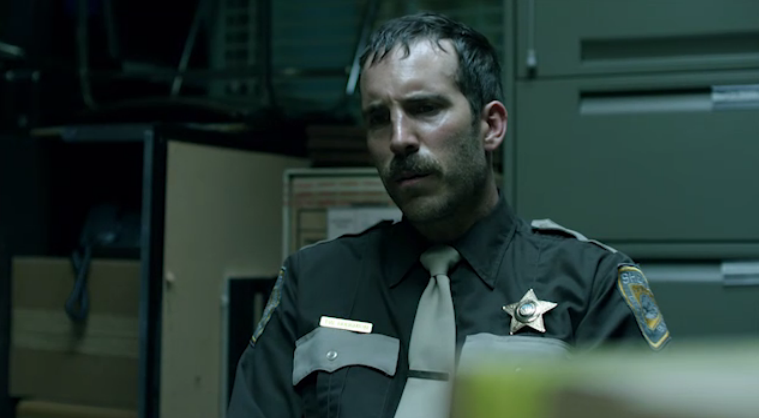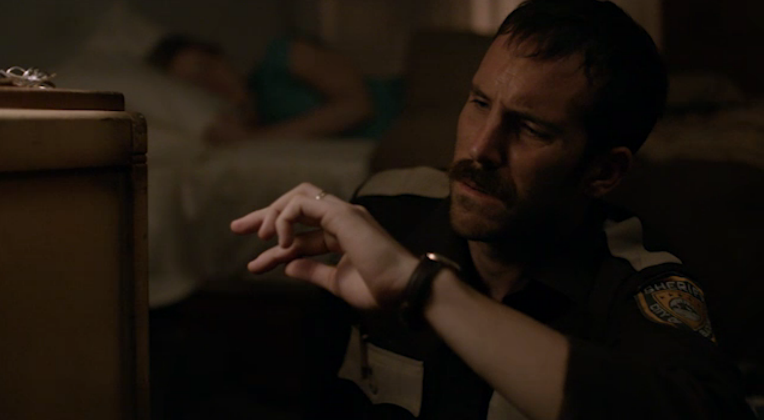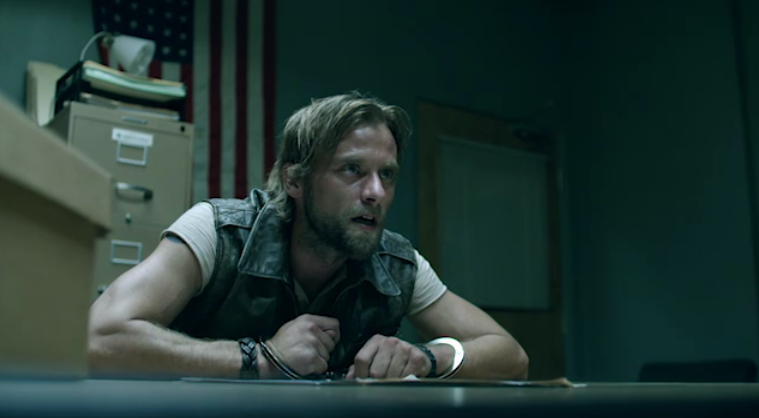'Outsiders' Postmortem: Thomas M. Wright On Wade's Ring, Breece's Death, and His Kentucky Road Trip

SPOILER ALERT: The recap for the “Mortar" episode of Outsiders contains storyline and character spoilers.
There are just two more episodes remaining in the first season of WGN’s Outsiders, and when Sheriff Wade Houghton took off his wedding ring in Tuesday’s “Mortar,” it probably wasn’t good news for the Farrells, or for any hopes of peace and quiet in the little Appalachian Kentucky town of Blackburn. Wade knows who killed his brother-in-law, Breece, but thinks he’s been lied to about his chance to bring the culprit — Farrell leader Big Foster — in for murder. Yahoo TV talked to Thomas M. Wright, the actor behind Wade, who talks about what motivates Wade and what’s at the heart of Outsiders’ story. He also previews the “storm” that’s going to wrap up Season 1, and shares his experiences spending time in real-life Kentucky Appalachia and how it made him committed to portray its citizens in a respectful, honest, non-stereotypical way.
Were you surprised when you found out what was going to happen to Breece?
No, I wasn’t actually, because I thought someone was going to have to fall… I think things are going to become only more difficult within that family.
Related: ‘Outsiders’ Star Jeb Kreager on Breece’s Fate
I think you and Jeb Kreager, who played Breece, have especially great chemistry, from that great scene in the coal company office when Wade returns the gift basket to the scene in the kitchen with Caleb and the confrontations at Breece’s house and the jail before he’s killed. Did you feel a special chemistry working with him?
I did, actually. I think for me the core of the entire show is family. I think the core of any reasonably long-running series has to be. The core of series like The Sopranos or Breaking Bad is family. Particularly when you get into later seasons, they can become such complex relationships. It was always great working with Jeb, and with Rebecca Harris, who plays Ledda, my sister, and Jackson Frazer, who plays my son Caleb. We all became really close.
We see in the aftermath of Breece’s death that Wade seems to have turned a corner, in terms of trying to stay off the drugs and committing himself to his family. Is this a commitment he’s going to make and keep?
I think Wade’s a pretty complex individual, and I think he’s a pretty solid individual, and we worked very hard to make Wade unpredictable. There is a lot of darkness in him and a lot of history that he’s not reconciled with. Life in those areas is complex, and as I said before, the family is the core of everything, despite whatever obstacles might be in the way. It was really important for me that this part of the story was imbued with the real dignity of people from that region in America, and that it had some echo of the reality of some aspects of life there. That really grounded the show in the issues of living in a small town in America, and especially in an area like Appalachia, which is historically the center of the war against poverty, which I think has been the victim of a lot stereotyping and mockery. It was really important to me to try to reflect the real concerns of people in a place like that.
Before the season started, series creator Peter Mattei told me you spent some time in Kentucky, getting to know people and life in the Appalachia part of the state.
I did. I left my family in Australia and I went over early, almost a month before production began, never having been to that part of the world. I went down on my own and spent time with, limited time with, a sheriff, some time down there in Appalachia. They really are resistant to the ways that they’re portrayed, you know, in television and movies, from The Beverly Hillbillies to Deliverance, so they were kind of reluctant to talk. I spent a lot of time with coal miners down there, with regular people. There’s certainly a lot of people in law enforcement, and there’s a lot of people in drug and alcohol rehabilitation down there, particularly [dealing with] the impact of OxyContin and those sort of really extreme prescription pain medications. I also just got a sense of what that region actually means, because it’s such a culturally strong region… talking to people at the Appalachian Center program at the University of Kentucky. One of the professors there, Shane Barton, was a real help, but also spending some time at the Appalachia Media Institute, the Appalshop, and just being in the landscape.
The things that they’re dealing with are really extreme forewarnings of the kind of conditions that can come from interference with the environment. You have these beautiful lakes and streams down there that nobody can touch. Nobody can go near them. I was actually driving with someone who was in the police department, state police, I believe… He said to me, “I’m really afraid that my children can’t live here anymore. This is the place I grew up, and this is the place that I call home, but I won’t be able to raise my children here. When they get to a certain age, I’m going to have to tell them to leave.” I think for all of us that’s really terrifying. Certainly the lack of opportunities is a huge thing. That’s something I think that we’re really trying to deal with and certainly something I tried to drag back, being really emphatic about that being in [Outsiders] at every turn.

At the end of the episode, Wade takes off his wedding ring. What is the significance of that?
I think very literally that’s about leaving the past behind, or trying to.
Is it also maybe a symbol that he had this agreement with Asa, that he was going to get to bring in the person who killed Breece, and that didn’t happen. He doesn’t know why it didn’t happen, though, the real reason. Is that sort of also a sign that he’s done making deals, that the gloves are off now, too?
I’ll leave that to your interpretation. For me, I think it has to do with the momentum that’s coming from outside of him and dragging him forward. Wade is lost in the past. I think the entire story of Wade Houghton is (that he’s) trapped somewhere between youth and young manhood, really. He’s found himself with a child and found himself with responsibilities and found himself in this position in this town, probably by virtue of the fact that he’s one of the few people that has remained there. He has Fults, his deputy … he’s not from the area. They have a policy in areas like this, and, assuming that Fults is from a similar area that I’d imagine is probably a little bit more urban … if you are a deputy sheriff, you have to go and work somewhere other then where you’re from, because it’s too hard, obviously, to police your own family or friends. That’s the thing that shows you how small and intimate these little communities are.

Joe Anderson as Asa Farrell
There are just two episodes remaining in Season 1, and the series has already been renewed for a second season. What can you see about the rest of this season?
It’s obviously all coming to a head. With the Farrells, I think Wade is having to make some attempt to take control of the situation, and the friction within the Farrell community is only going to become worse. So really, it’s a storm.
Outsiders airs Tuesday at 9 p.m. on WGN America


